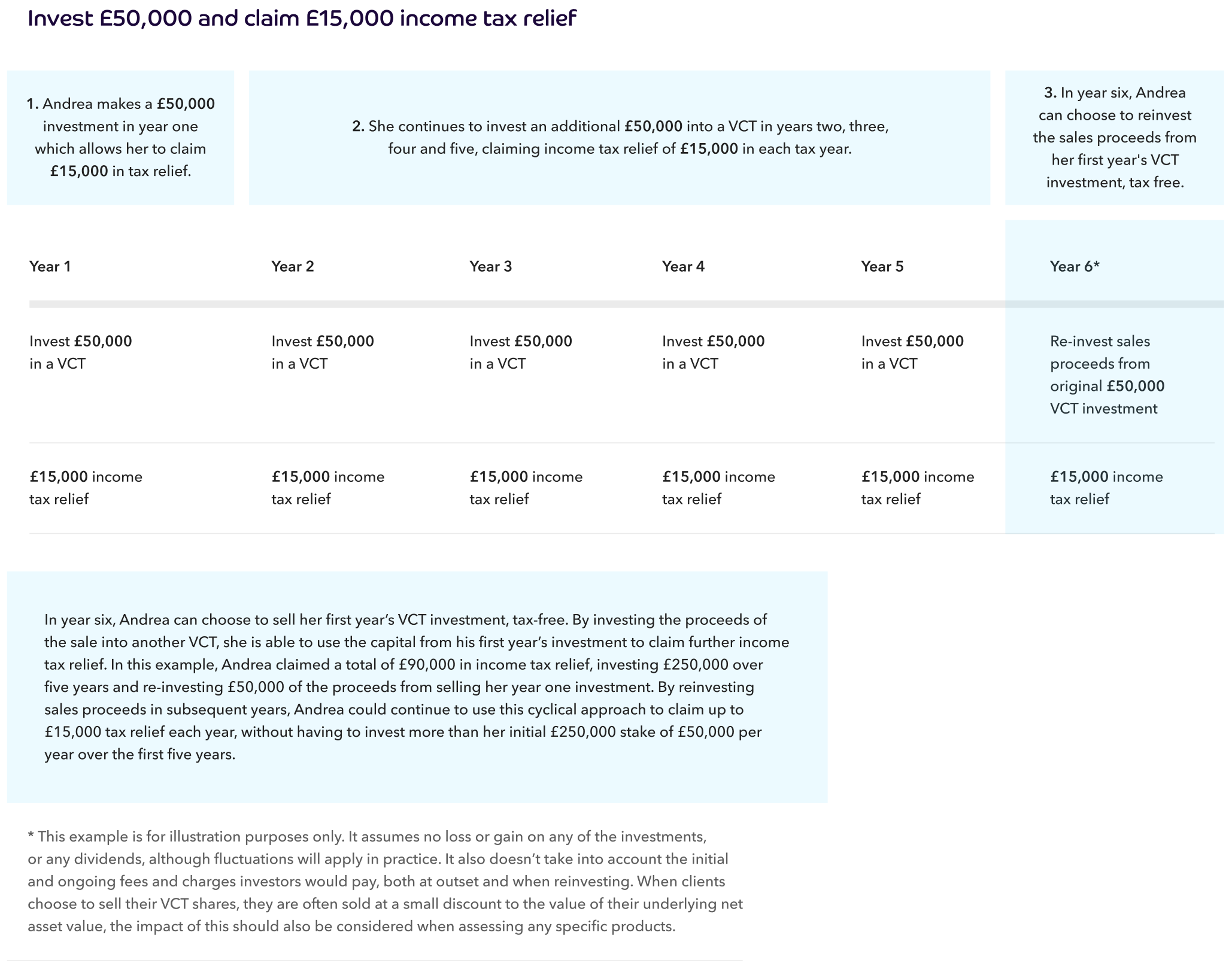Planning for medical professionals
It’s increasingly difficult for high-earning National Health Service (NHS) professionals to make more contributions to their generous salary-linked NHS pension schemes. With relatively high and steady incomes, many are now looking for alternative ways to invest for the future.
This tax-planning scenario explains how medical professionals could use a Venture Capital Trust (VCT) to offset income tax on their various income streams.
Build appropriate strategies for your clients
This scenario might be useful for clients who:
- are in the medical profession
- are thinking about retirement
- don’t need immediate access to the money in their pension
- are looking for tax-efficient ways to invest for the future
Things to keep in mind
- Nothing in this scenario should be viewed as advice.
- Any suitability decisions should be based on a client’s objectives and needs, as well as their attitude and capacity for risk.
- You should consider the value, eligibility and timings of tax reliefs and liabilities.
- You should consider the impact of relevant product charges (including initial and ongoing) like administration fees and annual management charges.
Andrea needs a tax-efficient way to invest additional income
Andrea, 59, is a successful surgeon and higher rate taxpayer on the salary-linked NHS pension scheme. She’s started to draw down some of her pension each year while also earning a high salary.
Since adding her pension to her income, Andrea has a lot more disposable cash. Because she’s restricted in what she can pay into her pension, she’s looking for other tax-efficient options to invest this additional income.
Andrea would consider investing in smaller UK companies and is comfortable with the associated investment risk.
Andrea’s financial adviser suggests investing in a VCT
Andrea talks to her financial adviser, who makes an assessment based on:
- her risk profile
- her investment time horizon: more than five years
- her attitude towards investing in smaller companies
Based on those factors, Andrea’s adviser suggests investing in a Venture Capital Trust (VCT).
With a VCT, Andrea can claim up to 30% income tax relief on up to £200,000 invested in any single tax year, as long as she holds her VCT shares for at least five years. Andrea can also benefit from tax-free dividends, and won’t have to pay capital gains tax when she sells the shares.
After five years, Andrea could sell her first VCT investment, then reinvest any proceeds in another VCT and use the additional income tax relief to reduce her year six income tax bill.
Similarly, Andrea could sell and reinvest her year two VCT investment in another VCT in year seven, giving her additional income tax relief. She could then continue doing this each year.
Risks to remember when investing in a VCT
- VCTs aren’t suitable for everyone. They’re high risk and should be considered as long-term investments. The value of an investment, and any income from it, can fall or rise. Investors may not get back the full amount they invest.
- Tax treatment depends on individual circumstances and tax rules can change in the future. Tax reliefs also depend on the VCT maintaining its qualifying status. Tax relief is available on investments of up to £200,000 per year.
- VCT shares could fall or rise in value more than other shares listed on the main market of the London Stock Exchange. They may also be harder to sell.
An overview of VCTs
VCTs were first introduced in 1995 and they’ve grown in popularity since. They could be a good fit for investors who:
- already have personal pensions and Individual Savings Accounts (ISAs)
- are comfortable with higher risk investments
VCTs are high risk and different to pensions and ISAs. A VCT isn’t likely to be suitable for investors who:
- need guaranteed income
- can’t tolerate loss
- want to keep immediate access to their money
Tax benefits of investing in a VCT
Here’s an example that shows how Andrea can claim income tax relief from each VCT investment she makes across several consecutive tax years. We’ve used six years as an example but she could use this method to keep claiming income tax relief indefinitely.

Things to remember about this example
- Please note that when selling shares in a VCT, it is not possible to claim tax relief on new shares bought in the same VCT within six months of the sale. You should consider the impact of this when assessing any specific products.
- Before investing in a VCT, investors should read the product prospectus and Key Information Documents (KID).
Interested in VCTs?
We’re the largest provider of VCTs in the market, offering three types of
investments that can provide attractive tax reliefs.
Octopus AIM VCTs
Octopus Apollo VCT
Octopus Titan VCT
About Octopus
We’re a financial services provider with a difference. Our main goal is to help people plan for their financial future, so we’ve built market-leading positions in tax-efficient investment, smaller company financing, renewable energy and healthcare.